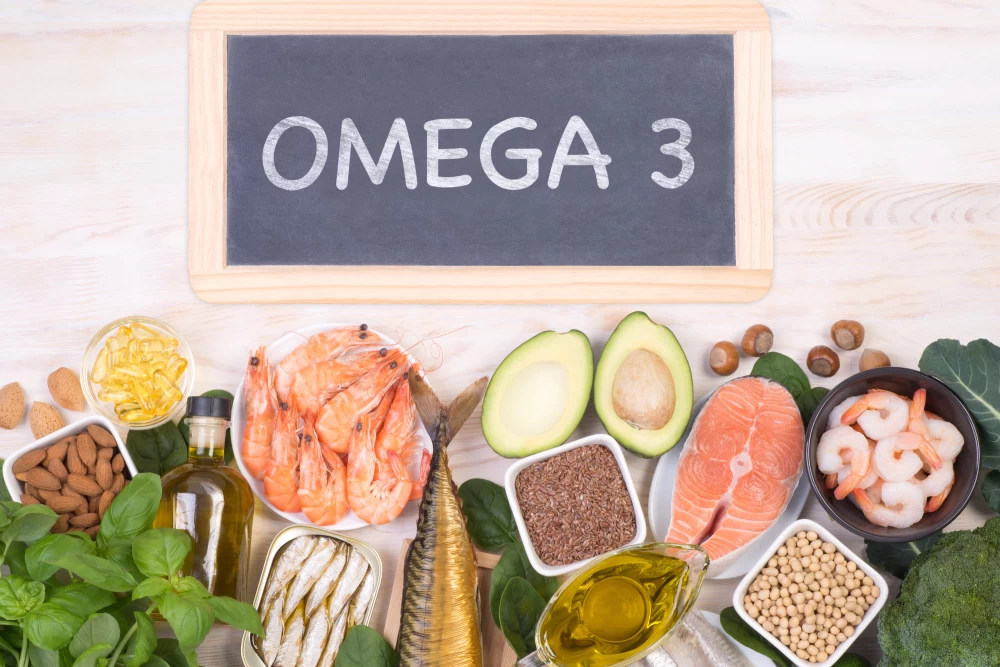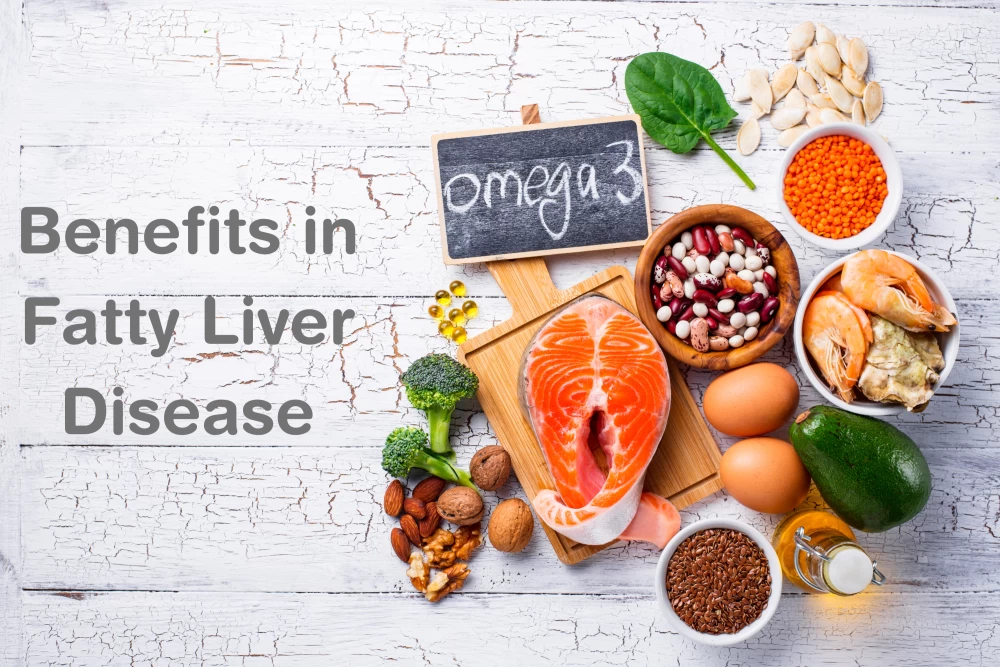
- 19th March 2023
Table of Contents
Benefits of Omega-3
One of the significant benefits of Omega-3 is that it helps reduce inflammation in the body, which can be beneficial for people with a fatty liver. Studies have shown that Omega-3 supplementation can help decrease liver fat and improve liver enzyme levels, which are essential markers for liver health. Foods rich in Omega-3 include fatty fish like salmon, sardines, anchovies, and mackerel. Another benefit of consuming Omega-3 is its ability to lower triglyceride levels in the blood. High triglyceride levels are associated with an increased risk of heart disease and stroke. Consuming foods high in Omega-3 or taking supplements has been shown to lower triglyceride levels significantly. Lastly, research has also shown that consuming adequate amounts of Omega-3 during pregnancy may support fetal brain development and reduce the risk of premature birth. It's important to note that pregnant women should consult their doctor before supplementing with Omega-3 as high doses may increase bleeding risks during childbirth. Incorporating sources of omega 3 into your everyday diet is a simple way to improve overall health and well-being while reducing inflammation on your body’s vital organs like the liver.
Sources of Omega-3
One of the best sources of omega-3 fatty acids is oily fish. Some examples include salmon, mackerel, sardines, and herring. These types of fish are rich in eicosapentaenoic acid (EPA) and docosahexaenoic acid (DHA), which are the most beneficial forms of omega-3s for our bodies. Another source of omega-3 is flaxseed oil or ground flaxseeds. Flaxseed oil contains alpha-linolenic acid (ALA), which can be converted into EPA and DHA by our bodies. However, it's important to note that this conversion process is not very efficient, so consuming oily fish may be a more reliable way to get your daily dose of omega-3s. Lastly, walnuts are also a good source of ALA. They can easily be added to salads or eaten as a snack on their own. Incorporating these sources of omega-3 into your diet can help improve liver function and reduce inflammation associated with fatty liver disease.
Diet Modifications for Fatty Liver
Omega-3 fatty acids are considered to be essential for the maintenance of good health. These fats play a vital role in reducing inflammation and promoting healthy liver function, which is why they are recommended as part of a diet modified for fatty liver. One easy way to incorporate omega-3s into your diet is by consuming oily fish such as salmon, mackerel or sardines on a regular basis. If you're not a big fan of fish, you can also get your daily dose of omega-3s from nuts and seeds like flaxseeds or chia seeds. Another way to consume omega-3s is through supplements. Fish oil supplements can provide a concentrated source of these beneficial fats without the need for high-fat foods that may worsen fatty liver disease symptoms. However, it's important to consult with your doctor before taking any supplements as they may interact with other medications you are taking or have unwanted side effects if taken in excessive amounts. In summary, incorporating omega-3 fatty acids into your diet could help improve liver function and reduce inflammation associated with fatty liver disease. Eating more oily fish and nuts/seeds, or taking supplements under medical supervision, can be great ways to boost your daily intake of this essential nutrient.
Foods High in Omega-3
Fatty liver disease is a condition where excess fat accumulates in the liver. Omega-3 fatty acids have been shown to be beneficial for those with fatty liver disease. Many foods are high in omega-3, making it easy to incorporate into your diet. Fish is an excellent source of omega-3, with salmon being a top choice. Other fish options include sardines, mackerel, and tuna. If you’re not a fan of seafood, flaxseed and chia seeds are also rich sources of omega-3s. Sprinkle them on top of salads or add them to smoothies for an easy boost. In addition to fish and seeds, walnuts are another great source of omega-3s. Snack on them throughout the day or add them to oatmeal or yogurt for breakfast. Incorporating these foods into your diet can help improve liver health and overall well-being.

Supplements to Consider
Omega-3 fatty acids are essential nutrients that play a vital role in maintaining overall health. They are known for their anti-inflammatory properties and have been found to be beneficial for people with fatty liver disease. The two primary types of omega-3 fatty acids are EPA and DHA, which can be obtained through dietary sources such as fish, nuts, and seeds or through supplements. Fish oil supplements are one of the most common ways to incorporate omega-3 fatty acids into your diet. They come in various forms such as capsules, liquids, and gummies. When selecting a fish oil supplement, it is essential to choose one that is high in EPA and DHA content. Another supplement that can help improve liver function is milk thistle extract. Milk thistle has been used for centuries as a natural remedy for liver problems due to its antioxidant and anti-inflammatory properties. Milk thistle supplements come in capsule form or as a tea. In summary, incorporating omega-3 fatty acids into your diet through supplements like fish oil or milk thistle extract can help support liver function and overall health. However, it's important to consult with a healthcare professional before starting any new supplement regimen to ensure it is safe and effective for you.
Tips to Maximize Intake
One of the best ways to manage a fatty liver is through diet. Omega-3 fatty acids can be particularly beneficial for those with this condition, as they have anti-inflammatory properties that can help reduce liver inflammation. To maximize your intake of omega-3s, consider incorporating fatty fish into your meals two to three times a week. Some examples of these types of fish include salmon, mackerel, and sardines. If you're not a fan of fish or simply want to diversify your sources of omega-3s, try adding flaxseed oil or chia seeds to your diet. Flaxseed oil can be used in salad dressings or as a substitute for other oils in cooking. Chia seeds can be sprinkled on top of yogurt or oatmeal in the morning for an easy and nutritious breakfast. In summary, consuming more omega-3 fatty acids may help improve the health of those with a fatty liver by reducing inflammation in the liver. Incorporating foods like salmon, mackerel and sardines are great options for getting more omega-3s in your diet but if you dislike seafood then try using flaxseed oil or chia seeds instead.
Conclusion
In conclusion, achieving a healthy balance in our diet is essential for maintaining good health. Incorporating Omega-3 fatty acids in our diets can help improve liver health and reduce the risk of developing a fatty liver. One way to do this is by consuming more fish or seafood that are rich in these essential fatty acids. However, it's important not to overdo it with any one food group as too much of anything can be harmful to our bodies. Instead, opt for a balanced and varied diet that includes fruits, vegetables, lean proteins, and whole grains. Additionally, regular exercise can also contribute to a healthier lifestyle and better overall well-being. Overall, finding a healthy balance between Omega-3 intake from foods like fish and other dietary sources along with an overall balanced diet is key when it comes to combating fatty liver disease and promoting optimal health.














